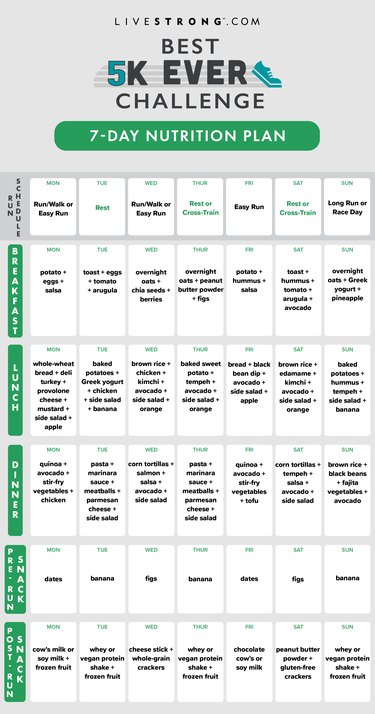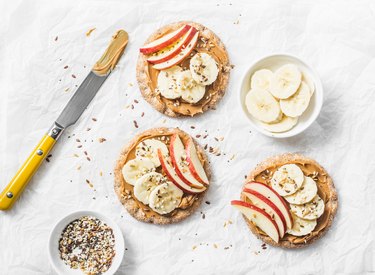
Runners might eat heaping bowls of pasta the night before a race, but whether or not they're successful the next morning depends on much more than that final bite of spaghetti.
Just like weeks of strategic workouts set you up for race-day success, so too will weeks of thoughtful snacks and meals made up of the right balance of macros and eaten at the optimal times.
Use this nutrition plan as part of our Best 5K Ever Challenge — or alongside your own 5K training — to feel your best throughout the month.
New to the Best 5K Ever Challenge?
Get all the details on our five-week running program here!
Your Weeklong 5K Training Diet Plan
This seven-day nutrition plan is designed for our First 5K Training Plan for beginners, but can be customized to fit any running schedule.
Swap around the days depending on your weekly training to reflect the right meals and snacks for the type of run you're doing that day.
For example, if you're going for two long runs in a week, simply use the Sunday nutrition plan twice. If your rest day is on Monday instead of Tuesday, swap Monday and Tuesday's nutrition plan. Simple as that!

Get a printer-friendly of this plan here and scroll down to the bottom of this article for a grocery list of everything you'll need.
Tip
Focus on eating foods with simple carbs or sugars before and after your runs. These sugars provide quick energy, are easier to digest and have also been shown to better replenish stored carbs after running.
Healthy foods rich in simple carbs include:
- fruit: bananas, figs and apples
- starchy vegetables: potatoes, corn and squash
- dairy products: milk and yogurt
How to Fuel Your Body for an Easy Run
Fueling for easy runs can be just as important as doing so for harder and longer runs, especially as your body is getting used to regular activity.
These easy runs and run/walks are designed to allow your body to recover from harder workouts and continue to build fitness throughout the week.
What to Eat Before an Easy Run
About an hour before you go on an easy run, give yourself an energy boost with a small carb-rich snack that has minimal fat and protein. To calculate the ideal amount of carbs for your snack, use this simple formula:
- Carbs (in grams) = 0.2 x your body weight in pounds (or 0.5 x your body weight in kilograms)
For a person who weighs 150 pounds, this is about 30 grams of carbs — the equivalent of a medium banana.
What to Eat After an Easy Run
About 30 minutes after your easy run, do your body another favor by eating a protein- and carb-rich snack. Calculate the ideal amount of carbs and protein for your snack by using this simple formula:
- Carbs (in grams) = 0.3 x your body weight in pounds (or 0.6 x your body weight in kilograms)
- Protein = 20 grams
That means a person who weighs 150 pounds should aim for 45 grams of carbs after running, about the amount in a medium banana and a slice of toast.
According to a January 2007 study in the American Journal of Physiology, Endocrinology and Metabolism, eating 20 grams of protein after exercise helps enhance muscle protein synthesis. Put more simply: A protein-rich snack will ensure your muscles repair themselves and adapt to your training.
The carbs in your post-run snack help to replenish the body's stores of carbohydrates and get you ready for your next session, per an August 2017 report in the Journal of the International Society of Sports Nutrition.
How to Fuel Your Body for a Hard Run
Hard runs are long runs, tempo runs, interval runs and races. Your body uses carbs to fuel these workouts, so it's essential that you take in carb-rich foods before and after in the form of simple carbs or sugars.
These carbs fuel your brain and muscles to perform during the run, as well as replenish all the stored carbs your body used.
What to Eat Before a Hard Run
Eat a carb-rich meal half an hour to two hours before your run. To calculate the perfect amount of carbs for this meal, use this simple formula:
- Carbs (in grams) = up to 1.8 x your body weight in pounds (or 4 x your body weight in kilograms)
- Protein = 15 to 25 grams
For a person who weighs 150 pounds, that's 270 grams of carbs pre-run. Aim for between 75 and 270 grams if that upper limit feels like too much. Or, split up your carbs within three to four hours before your run with options like:
- 3 cups of cooked oatmeal with a whole banana, a quarter cup of raisins and a tablespoon of honey (165 g carbs)
- 2 slices of toast with 2 tablespoons of jam, plus a 24-ounce sports drink (87 g carbs)
- 3 energy chews (24 g carbs)
Researchers investigated the effects of carbs on performance in high-intensity exercise on 27 college-aged males and found those who drank a carb-rich sports drink (compared to a low-carb placebo drink that tasted the same) performed better — and there was no significant difference between drinking it 30 minutes or two hours before exercising, per a June 2014 study in the International Journal of Sports Nutrition and Exercise Metabolism.
Related Reading
What to Eat After a Hard Run
Within 30 minutes after your hard run, eat a small snack with carbs and some protein to help your body adapt and recover. To determine the ideal amount of carbs and protein for this snack, use this simple formula:
- Carbs (in grams) = 0.5 x your body weight in pounds (or 1 x your body weight in kilograms)
- Protein = 20 to 40 grams
This equals around 75 grams of carbs for a person who weighs 150 pounds. Try two slices of toast with two tablespoons of jam and a large banana.
This post-run snack is especially important if your next workout is less than 24 hours away because your body has less time to recover and needs those nutrients.

What to Eat On Rest Days
Rest days are the best time to eat nutrient-dense foods high in fiber and fat, which could potentially cause digestion issues during runs.
While a big salad with black beans, nuts and fatty fish may be bursting with healthy nutrients (and flavor), the fiber and fat are slower to digest and may cause gut problems if eaten too close to when you start running. (And no one wants that.)
On rest days, focus on eating high-fiber foods like quinoa and lentils, since you don't need to worry about timing your foods for your runs on these days. Also, go for anti-inflammatory foods, like salmon, dark leafy greens and berries, to help your body recover.
Preparation Is Key
Practicing your pre-race meal and pre-race snack in training is also vital. That's why the seven-day nutrition plan includes similar breakfasts on interval/tempo/long run days as race day.
When you're training your muscles to perform during your race, you're also training your gut to behave. Familiarity with pre-race foods lowers your chances of indigestion, bloating and side stitches.
It's also worth noting that finding foods that work for you is a key element of sports nutrition that can't be ignored. Just because your friend loves eating baby food pouches of sweet potatoes before her runs doesn't mean that will work for you.
The Best Foods for Runners: A Grocery List for the 7-Day Nutrition Plan
Carb-Rich Foods
- oatmeal (old-fashioned or gluten-free)
- potatoes
- quinoa
- brown rice
- corn tortillas
- pasta (whole-grain or gluten-free)
- sprouted wheat toast (or gluten-free toast)
- bananas
- figs
- dates
- apples
- oranges
- crackers (whole-grain or gluten-free)
- frozen fruit
Protein-Rich Foods
- chicken
- turkey
- lean and fatty fish
- edamame
- tofu
- tempeh
- black beans
- hummus
- Greek yogurt
- chia seeds
- protein powder (whey or plant-based)
- cow's milk or soy milk
- cheese sticks
- peanut butter powder
Healthy Fat-Rich Foods
- avocado
- low-fat cheese
- nuts and nut butters
- seeds
Non-Starchy Vegetables
- frozen stir-fry vegetables or fajita vegetables (like onions and bell peppers)
- vegetables for a side salad (leafy greens, snap peas, cucumber, tomatoes and bell peppers)
- kimchi
- salsa
- marinara sauce